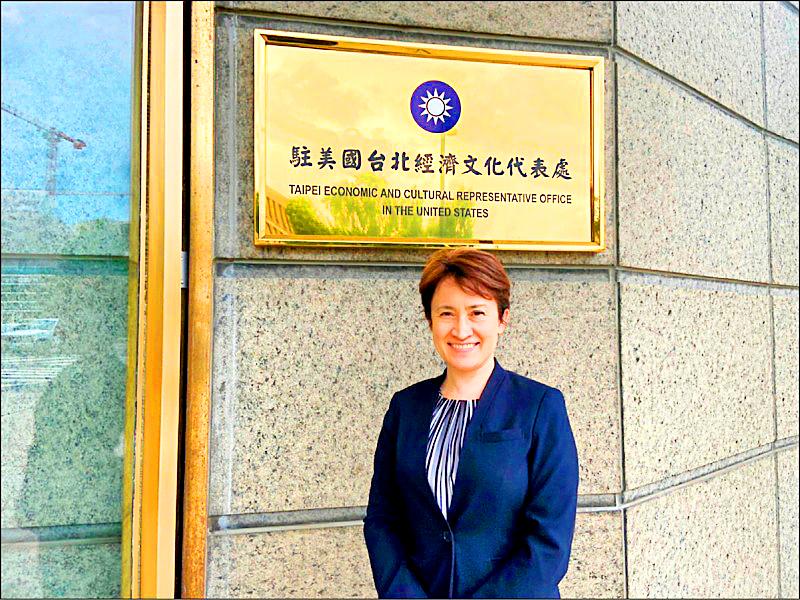Taiwan and the US should negotiate a bilateral trade agreement, Representative to the US Hsiao Bi-khim (蕭美琴) said on Monday during a virtual conference hosted by the Atlantic Council, a US think tank.
Taiwan and the US last month held the Taiwan-US Economic Prosperity Partnership Dialogue, and on Sept. 17 signed the Framework to Strengthen Infrastructure, Finance and Market Cooperation.
These actions show that both sides have taken an important step to improve bilateral economic relations, Hsiao said.

Photo from the Taiwan in the US Facebook page
“Both Taiwan and the US will continue to expand cooperation in terms of the supply chain, telecommunications, health and the high-tech industry,” she said.
Taiwan and the US have mutually complementary economies as demonstrated by Taiwanese firms manufacturing parts for Apple Inc and Tesla, Hsiao said.
The COVID-19 pandemic has illustrated that certain countries cannot be trusted, underscoring the necessity for Taiwan and the US to establish reliable supply-chain networks with trustworthy partners for 5G networks, cybersecurity, artificial intelligence and other issues, she said.
Taiwan’s national security is an integral part of regional stability and peace, Hsiao said.
Heritage Foundation senior analyst Riley Walters told the conference that President Tsai Ing-wen’s (蔡英文) decision to relax restrictions on US pork and beef has removed obstacles to trade talks.
The Taiwan-US Economic Prosperity Partnership Dialogue is far more significant than a trade deal, as the dialogue partially transcends trade policy differences and explores the tangible collaborations both sides can pursue, Walters said.
This is far more important to Taiwan, which is being sidelined by many regional trade agreements, he said.
Citing the signing of the Regional Comprehensive Economic Partnership on Nov. 15 and the willingness of its signatory countries to become part of the Comprehensive and Progressive Agreement for Trans-Pacific Partnership, it is of utmost importance that Taiwan and the US take measures to strengthen bilateral economic ties, Hsiao said.
Taiwan is ready and willing to join the trade frameworks, but due to geopolitical strategic concerns, it faces an arduous and bumpy road, she said.

An essay competition jointly organized by a local writing society and a publisher affiliated with the Chinese Communist Party (CCP) might have contravened the Act Governing Relations Between the People of the Taiwan Area and the Mainland Area (臺灣地區與大陸地區人民關係條例), the Mainland Affairs Council (MAC) said on Thursday. “In this case, the partner organization is clearly an agency under the CCP’s Fujian Provincial Committee,” MAC Deputy Minister and spokesperson Liang Wen-chieh (梁文傑) said at a news briefing in Taipei. “It also involves bringing Taiwanese students to China with all-expenses-paid arrangements to attend award ceremonies and camps,” Liang said. Those two “characteristics” are typically sufficient

A magnitude 5.9 earthquake that struck about 33km off the coast of Hualien City was the "main shock" in a series of quakes in the area, with aftershocks expected over the next three days, the Central Weather Administration (CWA) said yesterday. Prior to the magnitude 5.9 quake shaking most of Taiwan at 6:53pm yesterday, six other earthquakes stronger than a magnitude of 4, starting with a magnitude 5.5 quake at 6:09pm, occurred in the area. CWA Seismological Center Director Wu Chien-fu (吳健富) confirmed that the quakes were all part of the same series and that the magnitude 5.5 temblor was

The brilliant blue waters, thick foliage and bucolic atmosphere on this seemingly idyllic archipelago deep in the Pacific Ocean belie the key role it now plays in a titanic geopolitical struggle. Palau is again on the front line as China, and the US and its allies prepare their forces in an intensifying contest for control over the Asia-Pacific region. The democratic nation of just 17,000 people hosts US-controlled airstrips and soon-to-be-completed radar installations that the US military describes as “critical” to monitoring vast swathes of water and airspace. It is also a key piece of the second island chain, a string of

The Central Weather Administration has issued a heat alert for southeastern Taiwan, warning of temperatures as high as 36°C today, while alerting some coastal areas of strong winds later in the day. Kaohsiung’s Neimen District (內門) and Pingtung County’s Neipu Township (內埔) are under an orange heat alert, which warns of temperatures as high as 36°C for three consecutive days, the CWA said, citing southwest winds. The heat would also extend to Tainan’s Nansi (楠西) and Yujing (玉井) districts, as well as Pingtung’s Gaoshu (高樹), Yanpu (鹽埔) and Majia (瑪家) townships, it said, forecasting highs of up to 36°C in those areas